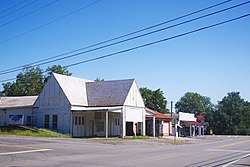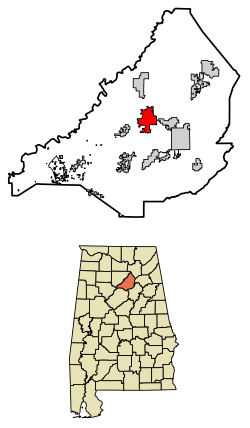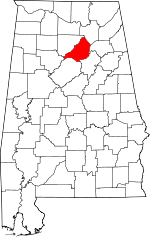Cleveland, Alabama
Cleveland is a town in Blount County, Alabama, United States. At the 2010 census the population was 1,303.[3]
Cleveland, Alabama | |
|---|---|
 View along U.S. Route 231 in Cleveland | |
 Location of Cleveland in Blount County, Alabama. | |
| Coordinates: 33°59′31″N 86°34′33″W | |
| Country | United States |
| State | Alabama |
| County | Blount |
| Government | |
| • Type | Town Hall |
| • Mayor | Sir Jeremy Wilson |
| Area | |
| • Total | 7.88 sq mi (20.41 km2) |
| • Land | 7.83 sq mi (20.28 km2) |
| • Water | 0.05 sq mi (0.13 km2) |
| Elevation | 525 ft (160 m) |
| Population (2010) | |
| • Total | 1,303 |
| • Estimate (2019)[2] | 1,306 |
| • Density | 166.82/sq mi (64.40/km2) |
| Time zone | UTC-6 (Central (CST)) |
| • Summer (DST) | UTC-5 (CDT) |
| ZIP code | 35049 |
| Area code(s) | 205, 659 |
| FIPS code | 01-15472 |
| GNIS feature ID | 0157920 |
History
Cleveland was settled in the 1820s, and had grown into a small community by the early 1880s. It was initially known as Dry Creek Crossroads, and afterward as Blackwood's Crossroads, after local entrepreneur John Blackwood. When a post office was established in the community, it was named in honor of President Grover Cleveland. The town incorporated in 1964.[4]
Geography
Cleveland is located in central Blount County at 33°59'31.326" North, 86°34'33.823" West (33.992035, -86.576062).[5] The Locust Fork of the Black Warrior River flows past the northwest side of the town. The National Register-listed Swann Covered Bridge, which spans the river, lies just west of Cleveland. U.S. Route 231 intersects Alabama State Route 79 north of the center of town. Route 231 leads southeast 7 miles (11 km) to Oneonta, the county seat, and north 56 miles (90 km) to Huntsville. Route 79 leads northeast 31 miles (50 km) to Guntersville and southwest 37 miles (60 km) to Birmingham.
According to the U.S. Census Bureau, the town has a total area of 7.9 square miles (20.4 km2), of which 7.8 square miles (20.3 km2) is land and 0.039 square miles (0.1 km2), or 0.64%, is water.[3]
Demographics
| Historical population | |||
|---|---|---|---|
| Census | Pop. | %± | |
| 1970 | 413 | — | |
| 1980 | 487 | 17.9% | |
| 1990 | 739 | 51.7% | |
| 2000 | 1,241 | 67.9% | |
| 2010 | 1,303 | 5.0% | |
| Est. 2019 | 1,306 | [2] | 0.2% |
| U.S. Decennial Census[6] 2013 Estimate[7] | |||
As of the census[8] of 2010, there were 1,303 people, 464 households, and 358 families residing in the town. The population density was 166 people per square mile (64.2/km2). There were 504 housing units at an average density of 63.8 per square mile (24.7/km2). The racial makeup of the town was 89.2% White, 0.3% Black or African American, 0.2% Native American, 8.6% from other races, and 1.4% from two or more races. 18.4% of the population were Hispanic or Latino of any race.
There were 464 households, out of which 35.6% had children under the age of 18 living with them, 62.5% were married couples living together, 10.1% had a female householder with no husband present, and 22.8% were non-families. 20.5% of all households were made up of individuals, and 11.5% had someone living alone who was 65 years of age or older. The average household size was 2.79 and the average family size was 3.23.
In the town, the population was spread out, with 26.0% under the age of 18, 8.4% from 18 to 24, 28.0% from 25 to 44, 25.1% from 45 to 64, and 13.7% who were 65 years of age or older. The median age was 36.8 years. For every 100 females, there were 94.2 males. For every 100 females age 18 and over, there were 105.5 males.
The median income for a household in the town was $46,786, and the median income for a family was $53,818. Males had a median income of $37,344 versus $25,313 for females. The per capita income for the town was $18,250. About 11.1% of families and 15.5% of the population were below the poverty line, including 27.6% of those under age 18 and 12.7% of those age 65 or over.
References
- "2019 U.S. Gazetteer Files". United States Census Bureau. Retrieved June 29, 2020.
- "Population and Housing Unit Estimates". United States Census Bureau. May 24, 2020. Retrieved May 27, 2020.
- "Geographic Identifiers: 2010 Demographic Profile Data (G001): Cleveland town, Alabama". U.S. Census Bureau, American Factfinder. Archived from the original on February 12, 2020. Retrieved September 17, 2013.
- Claire M. Wilson, "Cleveland," Encyclopedia of Alabama, 2012.
- "US Gazetteer files: 2010, 2000, and 1990". United States Census Bureau. 2011-02-12. Retrieved 2011-04-23.
- "U.S. Decennial Census". Census.gov. Retrieved June 6, 2013.
- "Annual Estimates of the Resident Population: April 1, 2010 to July 1, 2013". Retrieved June 3, 2014.
- "U.S. Census website". United States Census Bureau. Retrieved 2015-07-09.
External links

